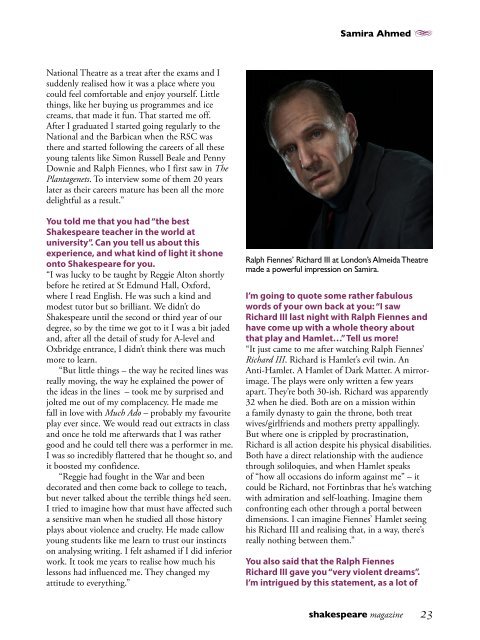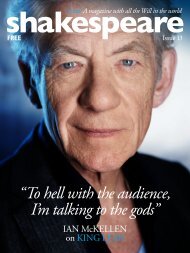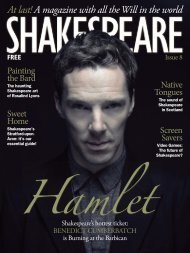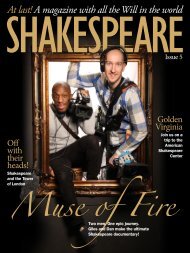Shakespeare Magazine 11
The shiny new-look Shakespeare Magazine 11 is adorned with a stunning cover image of Lily James and Richard Madden in Kenneth Branagh’s Romeo and Juliet. Also in Issue 11, SK Moore tells us about his compelling new graphic novel of Shakespeare’s Macbeth, while broadcaster Samira Ahmed turns her magnificently mercurial mind to the subject of Shakespeare. We have words with Pub Landlord comedian Al Murray about his recent brush with the Bard (and Judi Dench) at RSC Shakespeare Live. And our Editor raves about a 3-DVD box set of 1960s TV Shakespeare classic The Wars of the Roses. We chat with the great Don Warrington, star of Talawa Theatre’s earth-shaking King Lear at Manchester’s Royal Exchange – youthful co-star Alfred Enoch joins in too. Also this issue: we imagine what Tom Hiddleston’s Hamlet would look like, we explore the life of Elizabeth Siddal, Victorian Ophelia, and Bristol’s Insane Root scare the living daylights out of us with their Macbeth!
The shiny new-look Shakespeare Magazine 11 is adorned with a stunning cover image of Lily James and Richard Madden in Kenneth Branagh’s Romeo and Juliet. Also in Issue 11, SK Moore tells us about his compelling new graphic novel of Shakespeare’s Macbeth, while broadcaster Samira Ahmed turns her magnificently mercurial mind to the subject of Shakespeare. We have words with Pub Landlord comedian Al Murray about his recent brush with the Bard (and Judi Dench) at RSC Shakespeare Live. And our Editor raves about a 3-DVD box set of 1960s TV Shakespeare classic The Wars of the Roses. We chat with the great Don Warrington, star of Talawa Theatre’s earth-shaking King Lear at Manchester’s Royal Exchange – youthful co-star Alfred Enoch joins in too. Also this issue: we imagine what Tom Hiddleston’s Hamlet would look like, we explore the life of Elizabeth Siddal, Victorian Ophelia, and Bristol’s Insane Root scare the living daylights out of us with their Macbeth!
You also want an ePaper? Increase the reach of your titles
YUMPU automatically turns print PDFs into web optimized ePapers that Google loves.
Samira Ahmed <br />
National Theatre as a treat after the exams and I<br />
suddenly realised how it was a place where you<br />
could feel comfortable and enjoy yourself. Little<br />
things, like her buying us programmes and ice<br />
creams, that made it fun. That started me off.<br />
After I graduated I started going regularly to the<br />
National and the Barbican when the RSC was<br />
there and started following the careers of all these<br />
young talents like Simon Russell Beale and Penny<br />
Downie and Ralph Fiennes, who I first saw in The<br />
Plantagenets. To interview some of them 20 years<br />
later as their careers mature has been all the more<br />
delightful as a result.”<br />
You told me that you had “the best<br />
<strong>Shakespeare</strong> teacher in the world at<br />
university”. Can you tell us about this<br />
experience, and what kind of light it shone<br />
onto <strong>Shakespeare</strong> for you.<br />
“I was lucky to be taught by Reggie Alton shortly<br />
before he retired at St Edmund Hall, Oxford,<br />
where I read English. He was such a kind and<br />
modest tutor but so brilliant. We didn’t do<br />
<strong>Shakespeare</strong> until the second or third year of our<br />
degree, so by the time we got to it I was a bit jaded<br />
and, after all the detail of study for A-level and<br />
Oxbridge entrance, I didn’t think there was much<br />
more to learn.<br />
“But little things – the way he recited lines was<br />
really moving, the way he explained the power of<br />
the ideas in the lines – took me by surprised and<br />
jolted me out of my complacency. He made me<br />
fall in love with Much Ado – probably my favourite<br />
play ever since. We would read out extracts in class<br />
and once he told me afterwards that I was rather<br />
good and he could tell there was a performer in me.<br />
I was so incredibly flattered that he thought so, and<br />
it boosted my confidence.<br />
“Reggie had fought in the War and been<br />
decorated and then come back to college to teach,<br />
but never talked about the terrible things he’d seen.<br />
I tried to imagine how that must have affected such<br />
a sensitive man when he studied all those history<br />
plays about violence and cruelty. He made callow<br />
young students like me learn to trust our instincts<br />
on analysing writing. I felt ashamed if I did inferior<br />
work. It took me years to realise how much his<br />
lessons had influenced me. They changed my<br />
attitude to everything.”<br />
Ralph Fiennes’ Richard III at London’s Almeida Theatre<br />
made a powerful impression on Samira.<br />
I’m going to quote some rather fabulous<br />
words of your own back at you: “I saw<br />
Richard III last night with Ralph Fiennes and<br />
have come up with a whole theory about<br />
that play and Hamlet…” Tell us more!<br />
“It just came to me after watching Ralph Fiennes’<br />
Richard III. Richard is Hamlet’s evil twin. An<br />
Anti-Hamlet. A Hamlet of Dark Matter. A mirrorimage.<br />
The plays were only written a few years<br />
apart. They’re both 30-ish. Richard was apparently<br />
32 when he died. Both are on a mission within<br />
a family dynasty to gain the throne, both treat<br />
wives/girlfriends and mothers pretty appallingly.<br />
But where one is crippled by procrastination,<br />
Richard is all action despite his physical disabilities.<br />
Both have a direct relationship with the audience<br />
through soliloquies, and when Hamlet speaks<br />
of “how all occasions do inform against me” – it<br />
could be Richard, not Fortinbras that he’s watching<br />
with admiration and self-loathing. Imagine them<br />
confronting each other through a portal between<br />
dimensions. I can imagine Fiennes’ Hamlet seeing<br />
his Richard III and realising that, in a way, there’s<br />
really nothing between them.”<br />
You also said that the Ralph Fiennes<br />
Richard III gave you “very violent dreams”.<br />
I’m intrigued by this statement, as a lot of<br />
shakespeare magazine 23

















